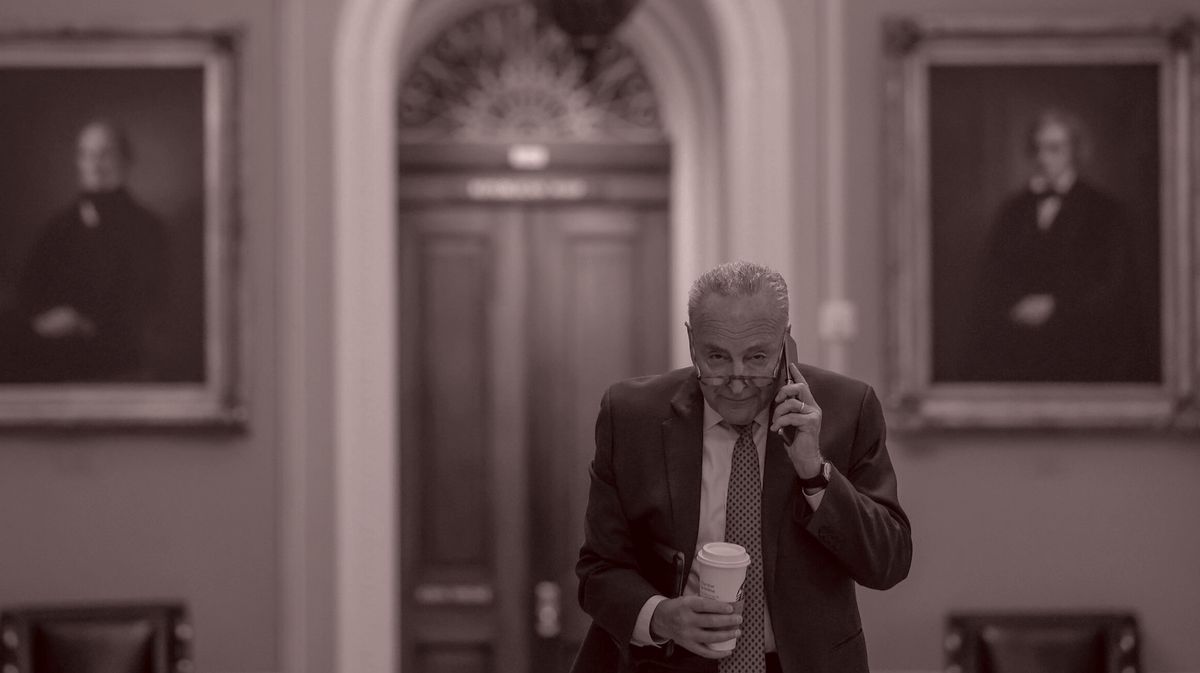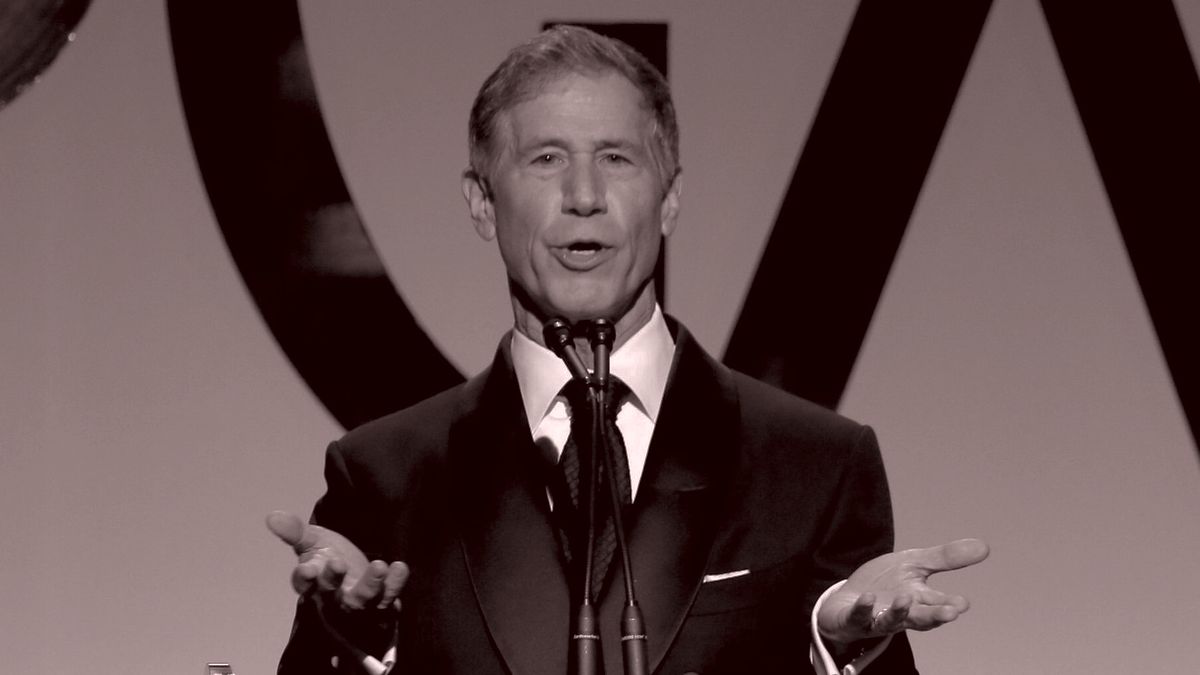Hello and welcome back to The Best & The Brightest. I’m Leigh Ann
Caldwell, back at my computer after Washington’s favorite St. Patrick’s Day tradition: the annual lunch on Capitol Hill where everyone tells stories about how Irish they are. This year, Speaker Mike Johnson hosted President Trump and Irish Taoiseach Micheál Martin. Sláinte!
Separately, I sat down for tea with Kevin
Sherry, the C.E.O. of Enterprise Ireland, a company that helps Irish businesses start, scale, and grow globally. Sherry and his team are making the rounds along with loads of Irish officials who are in town to tout Irish investment in the U.S.—and who, like the rest of the world, are nervous about how Trump’s tariffs will impact their businesses. It would obviously be better for them if there were fewer barriers to trade; Sherry also noted that supply chains are complicated, and borders
matter less and less now, a position that Trump evidently doesn’t agree with.
In tonight’s issue, fresh reporting on how angsty Democrats, this time in the Senate, are fretting over their upcoming government funding vote, and what insiders are saying about the woeful state of Democratic leader Chuck Schumer’s… leadership. In short, members are confused about how to vote, and
craving guidance. So far, they’re not getting it.
But first, speaking of a lack of clarity…
|
- Tariff
pandemonium: Trump’s latest round of tariffs against U.S. allies—most recently, a 25 percent duty on steel and aluminum imports that’s prompting retaliatory tariffs from Canada and the E.U.—are making some Republicans nervous. Senator Todd Young, for instance, has asked administration officials for more information about the tariffs, including what other countries can do to avoid them and what the end goal is. “We just want clarity on what the future looks like,” Young told
me. But there have been no formal protests from the president’s party—nary even a weakly worded letter to the administration.
In fact, the House just gave Trump wider latitude to issue tariffs, and made it more difficult for Congress to stop him. Recall that the Constitution says—and at least some Republicans still believe—that imposing tariffs is Congress’s job. (You can read my piece about Rand Paul’s lonely stand on this issue
here.) But Trump, and presidents before him, have used national emergency declarations to expand their powers, with sometimes flimsy pretexts. Most recently, Trump has cited border crossings and fentanyl trafficking as a justification for his multifront trade war. In voting to fund the government yesterday, the House changed its rules so that they can’t consider
legislation to end those national emergencies for the rest of the year.
The move was an extreme one, though neither unexpected nor unprecedented. Republicans’ grasp on the House is narrow, and it’s possible that a member of their party (ahem, Rep. Thomas Massie, perhaps) could join Democrats to try to wrest some control back from the president. G.O.P. members get quite defensive when asked about this latest delegation of their powers, and correctly point out that
Democrats passed similar legislation in the past to prevent Republicans from forcing President Joe Biden to end the national Covid emergency. Nevertheless, Trump is managing to get even more power.
|
|
|
A MESSAGE FROM OUR SPONSOR
|
|
|
- More
from Chuck Schumer’s no good, very bad week: It’s not just the funding vote: The leader of the Senate Dems is having a tough time on the political front. Jeanne Shaheen, the moderate, competent New Hampshire senator and former governor who has won four terms as a Democrat in her purplish state, announced today she won’t run again. She’s 78, so this is obviously the correct decision, since too many people age in place in the Senate. But it’s a blow to Schumer, who now will
have to spend even more money and time recruiting and electing a Democrat for a seat that’s one of the Republicans’ top pickup opportunities. This after Senator Gary Peters announced his retirement, putting Michigan in play for Republicans, as did Senator Tina Smith in Minnesota, a reliably blue state that Trump has become obsessed with winning.
|
|
|
As responsibility for funding the government falls on the Senate, Democrats are growing
nervous that Chuck Schumer hasn’t offered them much of a strategy, or a viable off-ramp, to navigate what Republicans are already framing as a possible “Schumer shutdown.”
|
|
|
Chuck Schumer, the typically jovial Senate Democratic leader, has
always prided himself on his vintage flip phone and preternatural ability to remember colleagues’ numbers. Lately, however, Schumer hasn’t been rolling calls with the urgency that his caucus has come to expect. Indeed, as Senate Democrats stare down the barrel of their first consequential vote, I’m told Schumer is as torn and demoralized as the rest of his party.
Democrats, of course, have vanishingly little power in Washington these days. One of their fleetingly few points of leverage
is the upcoming Senate vote on the Republican bill to fund the government, which passed the House on Tuesday despite near-unified opposition from their party brethren. Its fate now falls to Senate Democrats, at least eight of whom would need to provide the votes to overcome a filibuster. Based on my conversations on the Hill this week, it’s clear that many of them fear being held responsible for a potential government shutdown. At the same time, however, they’re feeling immense pressure from
their angry-as-hell constituents to do something about Donald Trump and Elon Musk’s wrecking-ball-style demolition of the federal government, and about looming Republican budget cuts that could impact essential programs like Social Security and Medicaid—Trump’s insistence to the contrary notwithstanding.
In short, it’s the kind of moment that party leaders are made for. Particularly someone like Schumer, who boasts of being
in constant contact with his members, weighing their concerns and moods, helping craft strategy—even if members and staff sometimes complain that he’s afraid to play hardball and often defaults to telling members what they want to hear. But these days he doesn’t seem to be telling members much of anything, other than to keep their powder dry and their mouths shut as reporters probe his proclamation that his caucus is unified. (It’s not.)
|
|
|
A MESSAGE FROM OUR SPONSOR
|
|
|
Ahead of a two-hour, closed-door caucus meeting on Tuesday, members expected to get some
answers about how they should vote, and how they should message their votes. Instead, I’m told, they got a grievance-filled brainstorming session in which Schumer did a lot of… listening. The meeting ended without a unified message or plan. “Complete lack of leadership,” one Democratic aide said. “There’s no sense of direction.”
As early as last week, I began hearing Democrats grumble
that Schumer was keeping his cards too close to the vest and offering little insight into his thought process on the funding bill. In hindsight, perhaps, he had no cards to show. Democrats are frustrated that Schumer didn’t ready an aggressive plan to tear apart and criticize the House Republican bill. He didn’t threaten Senate Majority Leader John Thune and his conference with consequences in private, let alone in public.
Instead, Democrats
have told me, Schumer’s strategy ahead of the House vote seemed to be to pray that Speaker Mike Johnson couldn’t coalesce his usually divisive Republican conference to pass a government spending bill. When asked what he was telling his members at his weekly news conference on Tuesday—by which point much of the reporting had made clear that the House would pass the bill—Schumer spent barely five seconds saying he’d “wait and see what the House does,” before moving on quickly. He
apparently didn’t want to believe that the House could fall in line, not because of a Johnson masterstroke, but because of G.O.P. fealty to Trump. Now, funding the government is the Senate’s problem.
|
In some ways, it seems, Senate Democrats have already lost the messaging war. Republicans have spent days
framing a potential shutdown as a “Schumer shutdown,” while Schumer has avoided talking about it. Certainly, the issue is hard; the upcoming funding vote could be the most torturous that any Senate Democrat has taken. “We’re choosing between awful and terrible,” Senator Raphael Warnock told me, describing the impossible choice between capitulating to Trump and Musk’s cuts, or withholding their votes and likely triggering a government shutdown that would create even more
uncertainty for government workers and the country at a time when the White House is not afraid to operate outside the bounds of the law.
|
|
|
The shutdown perils for Dems are substantial, and may ultimately play into Trump and
Musk’s hands anyway. Politically, Democrats fear they’ll be blamed, even though Republicans control the government. They’re worried, too, about how they’d get the government back open: Republicans could force them to vote on turning the lights back on one agency at a time—making them decide whether to fund the Federal Aviation Administration, say, without receiving any concessions from Trump. Plus, a shutdown could wreak more havoc on the federal workforce, especially since it would fall to the
Office of Management and Budget under Russell Vought—who has long dreamed of eliminating large swaths of the government—to determine which employees are “essential.” What if Musk decides to fire all government employees deemed “nonessential” and those government workers never get their job back? Wired reported this week that Musk
wants a shutdown to more easily fire government employees. Those are the questions that Democrats, and Schumer, are grappling with.
Schumer’s defenders say the leader can’t be heavy-handed, and must consider the demands and concerns of his members as he tries to navigate his caucus through an unprecedented situation with a mercurial president. He’s cautious about careening toward a shutdown when
the stakes are so high and the consequences so unpredictable. His members are having to weigh the anger from their animated base against the knowledge that any short-term gain of sticking it to Trump could lead to long-term havoc.
On the other hand, if they vote for Republicans’ funding bill, Democrats are well aware they’ll be basically offering up a “slush fund” to Trump with few guardrails on how
he can spend the money. They worry that if they don’t take a stand now, then Republicans will continue to roll them at every turn. Senate Democrats are also under pressure from their House counterparts after Minority Leader Hakeem Jeffries managed to keep his caucus united in opposition to the bill in the House. “If not now, when? If not us, then who?” California Rep. Scott Peters said in a statement. (Arguably, House Democrats had an easier time holding the
line since they could not, by themselves, tank the bill; the dynamics are different in the Senate, where the filibuster prevails.)
Schumer insists his caucus is unified, too, at least on a short-term funding alternative. During another day of closed-door discussions, he told Senate Democrats that the eight Democratic votes necessary to fund the government aren’t there, and he made the same pronouncement on the floor. (Senator Rand Paul has already said he’ll vote against
it, which is why Republicans need eight Democrats to advance the bill.) But based on my discussions with Democrats, they aren’t unified on what to do about the vote they actually face. In fact, they’re not unified in their predictions of how many of them will vote for the funding bill—some think there are more than eight “yea” votes to fund the government in their midst. Schumer could just be trying to instill fear in Republicans, who are also a bit nervous about how this will
all play out, but if there’s a bigger strategy here, it’s a headscratcher.
One Democratic strategist posited to me last week that Senate Democrats would thread the needle, providing the members needed to get past the 60-vote threshold in the procedural votes before voting against actual passage of the bill, which requires only a simple majority—an old-school tactic that lets members claim not to have
obstructed process even as they opposed the underlying legislation. But as the public, especially the activated base, understands Senate procedure more than most, it’s a hard needle to thread.
There’s an old adage on Capitol Hill that it’s easier to lead in the minority, when the party out of power has no ability to pass its agenda. But Schumer’s performance on funding is giving Democrats the worst
of all governing worlds: They have no power, and, apparently, no leadership either.
|
|
|
Join Emmy Award-winning journalist Peter Hamby, along with the team of expert journalists at Puck, as they let you in on the
conversations insiders are having across the four corners of power in America: Wall Street, Washington, Silicon Valley, and Hollywood. Presented in partnership with Audacy, new episodes publish daily, Monday through Friday.
|
|
|
Unique and privileged insight into the private conversations taking place inside boardrooms and corner offices up and down
Wall Street, relayed by best-selling author, journalist, and former M&A senior banker William D. Cohan.
|
|
|
Need help? Review our FAQ page or contact us for assistance. For brand partnerships, email ads@puck.news.
You received this email because you signed up to receive emails from Puck, or as part of your Puck account associated with . To stop receiving this newsletter and/or manage all your email preferences,
click here.
|
Puck is published by Heat Media LLC. 107 Greenwich St, New York, NY 10006
|
|
|
|





























